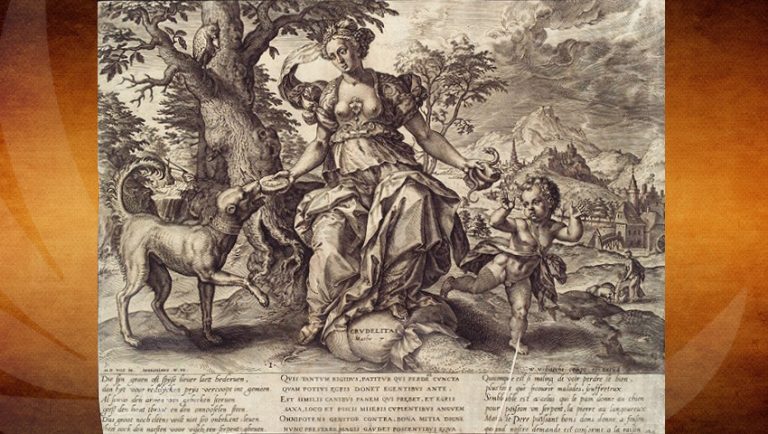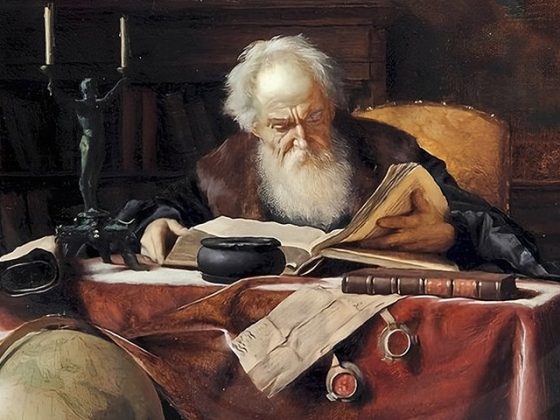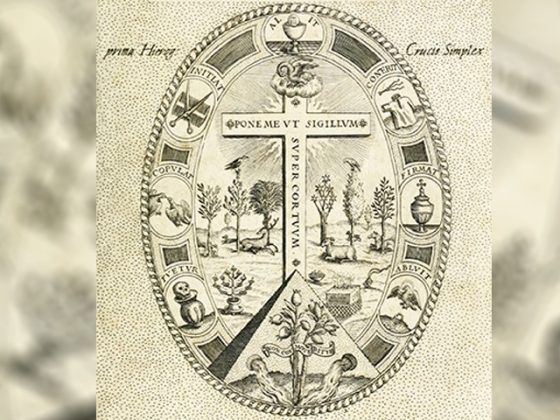Dearest friends:
I am very pleased to send you this engraving, which was drawn and edited by the Flemish artist Hieronymus Wierix (1553-1577).
The engraving is called…
…CRVDELITAS
─'Cruelty'─
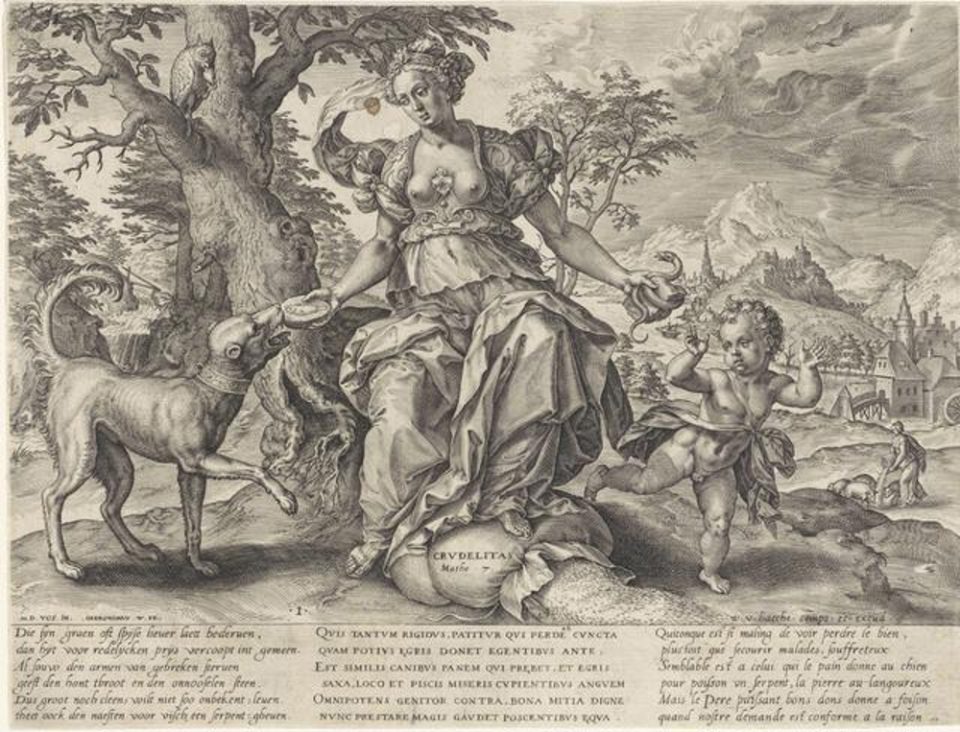
First of all, it must be said that in this work of art the cruelty of our animal Ego is represented. The female personification of cruelty is seated on an open bag from which the grain comes out. On this bag is written in Latin CRVDELITAS and the word “Mathe, 7”, referring to Matthew verse 7, where it says: “Do not give what is holy to the dogs; nor cast your pearls before swine, lest they trample them and turn and tear you in pieces……”.
The woman in our engraving gives a loaf of bread with a fish to a dog and a stone with a snake to a small child. This brings us back to that parable that speaks, in the Holy Scriptures, about being charitable to one's fellow man.
The engraving points out the hypocrisy of human societies, which claim to be Christian but do not prove their faith with deeds.
In our world every day, huge numbers of children die in places like Africa and Central America, and many industries prefer to throw away a lot of leftover food instead of distributing it in places on our planet where hunger is rampant. Such actions are done with the selfish purpose of keeping their prices in the trade balance of the peoples.
All this is heartbreaking and, although everyone sees it, no one feels the KAOM complaining about the injustice that is committed. This is because, as our Patriarch, the V.M. Samael Aun Weor, so well said: “In these times charity has caught a cold…”.
This global situation has led non-governmental organizations to create human groups that are dedicated to demanding a little justice from the rulers of our societiesto try to alleviate the disorder that corrodes our entrails, despite wanting to appear to be civilized citizens, like the woman in our illustration.
Everyone is very busy with the care of their bodies, as the blessed Melchizedek so well expressed in the prophecy he pronounced in a Tibetan monastery in one of his apparitions, but they stubbornly forget their souls, that is the crude reality of the facts.
In this artistic work, in addition to the dog and the child that we have already mentioned, we also see a tree behind the maiden, and on that tree appears an owl carrying a heart in one of its claws. This owl is symbolizing and indicating to us the need to remain as sentries in a state of war, and in relation to our theme it means that we must develop self-observation to activate the strength of the heart, indicated by the heart that the aforementioned bird carries in its claws. This also tells us about understanding that the Ego does not only take refuge in our thoughts, but also in our feelings. The V.M. Samael went so far as to say that the heart is also a refuge of many aggregates… For this reason our owl is eating this heart, meaning that self-observation must also devour egoic feelings.
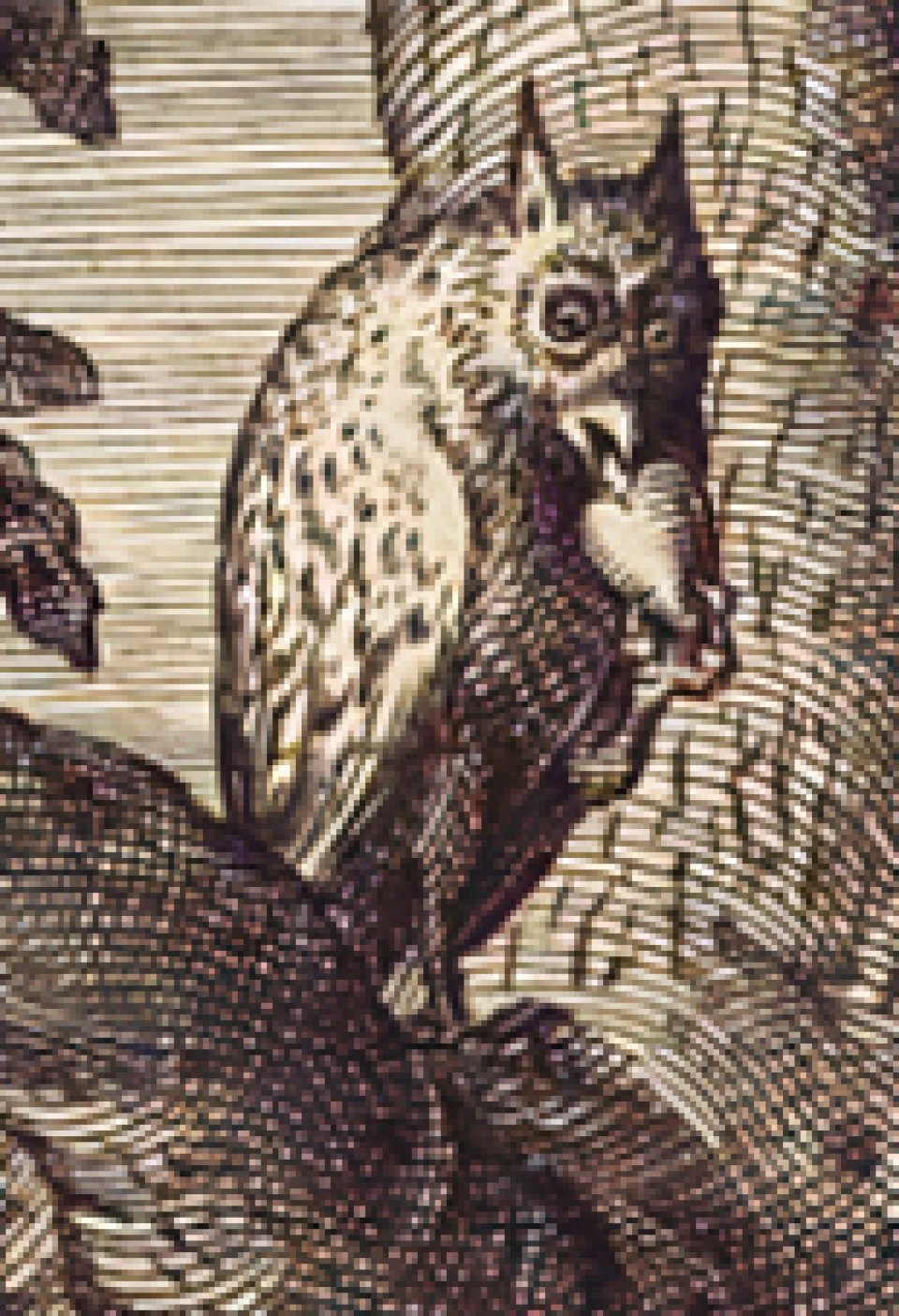
On the right, in the background, we see a rural landscape with a woman feeding the pigs. We also observe a river with a mill, while we see a hill and a town with its towers. All this represents the horizontal life of human pseudo-beings.
Something very strange that catches our attention is the fact that a phallus emerges from the tree behind the maiden ─we attach the detail─. This is there to indicate to us that the philosophical tree, the BEING, has its energy, its strength, based on the sexual energy itself; therein lies its potentiality.
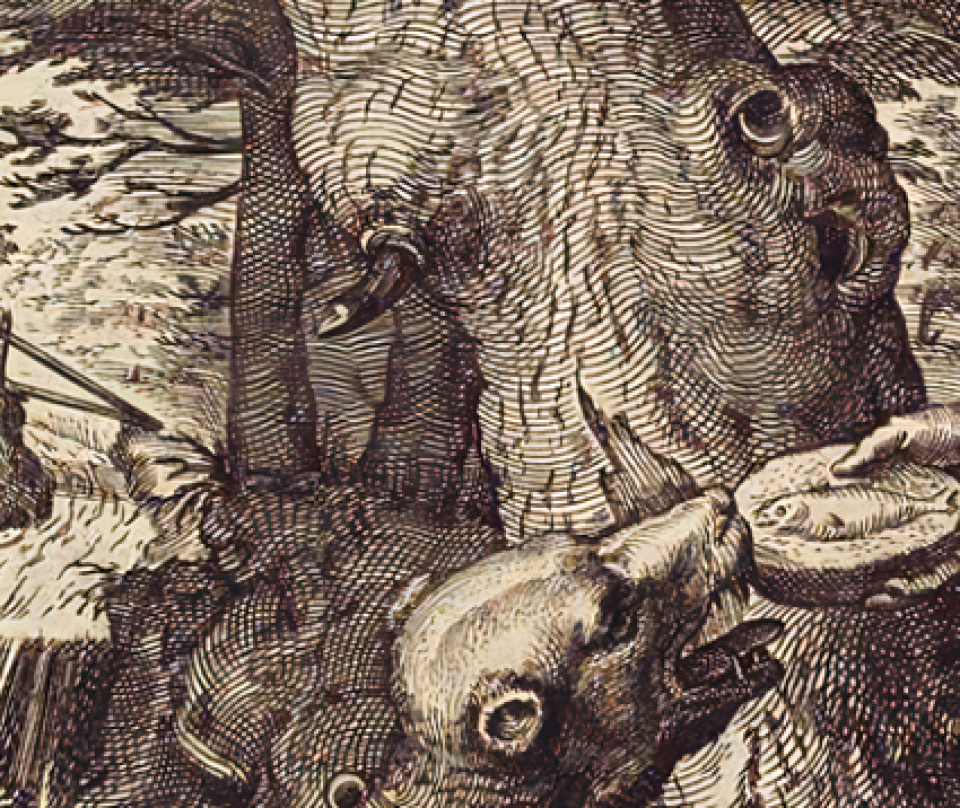
At the bottom of the drawing we are shown a six-line explanatory poem in Dutch, Latin and French. This was the artist's concern when he made this work, wanting his message to be understood in several languages.
The text in Latin:
«QUIS TANTUM RIGIDVS PATITVR QUI PERDE CVNCTA
QVAM POTIUS AEGRIS DONET EGENTIBUS ANTE,
EST SIMILIS CANIBVS PANEM QVI PRAEBET, ET EGRIS
SAXA, LOCO ET PISCIS MISERIS CUPIENTIBVS ANGVEM [.]
OMNIPOTENS GENITOR CONTRA, BONA MITIA DIGNE
NVNC PRESTARE MAGIS GAVDET POSCENTIBVS AEQVA».
The text in French:
“Quiconque est si maling de voir perdre le bien, plus fost que fecourir malades, souffreteux semblable est a celui qui le pain donne au chien pour poisson un serpent, la pierre au langoureux. Mais le Pere puissant bons dons a foison quand nostre demande est conforme a la raison.”
A translation in English:
‘Someone [who is] so hard that he tolerates losing all [his] goods rather than giving them to the sick and destitute, is like one who offers bread to dogs, but to the sick stones and, instead of fish, to the desirous wretched [he offers] a snake.
On the contrary, the Almighty Progenitor now enjoys giving suppliants more gifts appropriately than [would be] equitable.'
A portion of Matthew 7:
“Judging others:
1. “Judge not, that you be not judged.
2. For with what judgment you judge, you will be judged; and with the measure you use, it will be measured back to you.
3. And why do you look at the speck in your brother’s eye, but do not consider the plank in your own eye?
4. Or how can you say to your brother, ‘Let me remove the speck from your eye’; and look, a plank is in your own eye?
5. Hypocrite! First remove the plank from your own eye, and then you will see clearly to remove the speck from your brother’s eye.
6. “Do not give what is holy to the dogs; nor cast your pearls before swine, lest they trample them under their feet, and turn and tear you in pieces.
Prayer and the golden rule.
7. Ask, and it will be given to you; seek, and you will find; knock, and it will be opened to you.
8. For everyone who asks receives, and he who seeks finds, and to him who knocks it will be opened.
9. Or what man is there among you who, if his son asks for bread, will give him a stone?
10. Or if he asks for a fish, will he give him a serpent?
11. If you then, being evil, know how to give good gifts to your children, how much more will your Father who is in heaven give good things to those who ask Him!
12. Therefore, whatever you want men to do to you, do also to them, for this is the Law and the Prophets.”
Remember, dear reader, that when the blessed Master Samael was with us here on Earth he wanted to create something that he called Institute of Universal Charity. With this institute the Master wanted all the Gnostics ─instructors or companions of the advanced chambers─ to contribute with a small donation, or simply with bags of food that should be distributed among the homeless of our world. In this way we, the Gnostics, would help in some way to eradicate the scourge of famines in our world. But what happened to that majestic idea?
Answer: The same “Gnostic little companions” dedicated themselves to stealing the funds that were accumulating in this institute for the good of the hungry and finally that project died prematurely due to the greed of the “I”. Unbelievable, but true!!
Part of our self-observation must be directed toward these atrocities that the “I” pushes us to perform when our famous inner psychological work is hypocritical, false or chimerical.
I now give you some sentences for reflection:
“Charity that is only insinuated through almsgiving is a means of preserving misery.”
Jacques Delille
“The great miracle of Jesus Christ is, without contradiction, the reign of charity.”
Napoleon
“There is no better bag than charity.”
Cervantes
“The blind man does not see the hand that helps him, it is God who sees it.”
Victor Hugo
“Charity is not the patrimony of a school, of a religion or of a particular people: it is a profoundly human virtue.”
José Zorrila
CONCORDIA DOMI, FORIS PAX.
‘Harmony at home, peace outside of it'.
KWEN KHAN KHU


